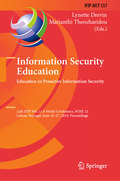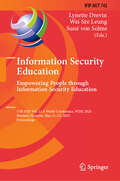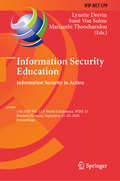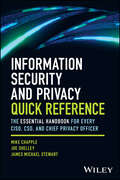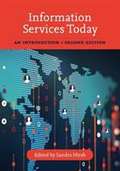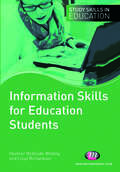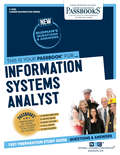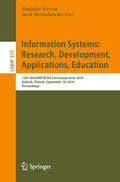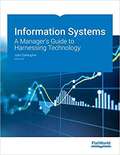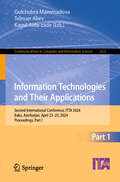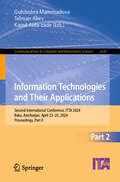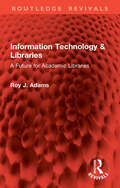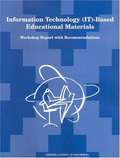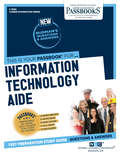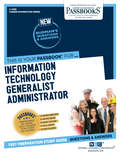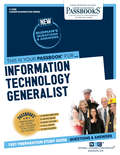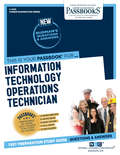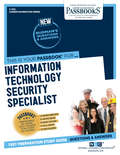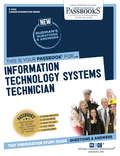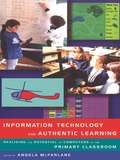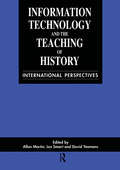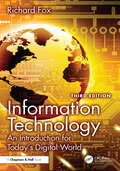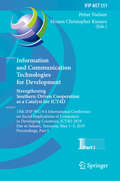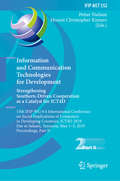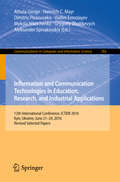- Table View
- List View
Information Security Education. Education in Proactive Information Security: 12th IFIP WG 11.8 World Conference, WISE 12, Lisbon, Portugal, June 25–27, 2019, Proceedings (IFIP Advances in Information and Communication Technology #557)
by Marianthi Theocharidou Lynette DrevinThis book constitutes the refereed proceedings of the 11th IFIP WG 11.8 World Conference on Information Security Education, WISE 12, held in Lisbon, Portugal, in June 2019.The 12 revised full papers presented were carefully reviewed and selected from 26 submissions. The papers are organized in the following topical sections: innovation in curricula; training; applications and cryptography; and organizational aspects.
Information Security Education. Empowering People Through Information Security Education: 17th IFIP WG 11.8 World Conference, WISE 2025, Maribor, Slovenia, May 21–23, 2025, Proceedings (IFIP Advances in Information and Communication Technology #742)
by Lynette Drevin Suné Von Solms Wai Sze LeungThis book constitutes the refereed proceedings of the 17th IFIP WG 11.8 World Conference on Information Security Education, WISE 2025, held in Maribor, Slovenia, during May 21–23, 2025.The 13 full papers presented were carefully reviewed and selected from 30 submissions. The papers are organized in the following topical sections: Workforce and Curriculum Development; Curriculum and Research Development; Gamification in Cybersecurity Education; Innovative Approaches to Cybersecurity Awareness; Papers Invited from SEC; and Discussions.
Information Security Education. Information Security in Action: 13th IFIP WG 11.8 World Conference, WISE 13, Maribor, Slovenia, September 21–23, 2020, Proceedings (IFIP Advances in Information and Communication Technology #579)
by Marianthi Theocharidou Lynette Drevin Suné Von SolmsThis book constitutes the refereed proceedings of the 13th IFIP WG 11.8 World Conference on Information Security Education, WISE 13, held in Maribor, Slovenia, in September 2020. The conference was held virtually due to the COVID-19 pandemic. The 13 full papers presented were carefully reviewed and selected from 28 submissions. The papers are organized in the following topical sections: teaching methods and tools; cybersecurity knowledge within the organization; and teaching of detection and forensics.
Information Security and Privacy Quick Reference: The Essential Handbook for Every CISO, CSO, and Chief Privacy Officer
by Mike Chapple James Michael Stewart Joe ShelleyA fast, accurate, and up-to-date desk reference for information security and privacy practitioners everywhere Information security and privacy roles demand up-to-date knowledge coming from a seemingly countless number of sources, including several certifications—like the CISM, CIPP, and CISSP—legislation and regulations issued by state and national governments, guidance from local and industry organizations, and even international bodies, like the European Union. The Information Security and Privacy Quick Reference: The Essential Handbook for Every CISO, CSO, and Chief Privacy Officer is an updated, convenient, and accurate desk reference for information privacy practitioners who need fast and easy access to the latest guidance, laws, and standards that apply in their field. This book is the most effective resource for information security professionals who need immediate and correct solutions to common and rarely encountered problems. An expert team of writers—Joe Shelley, James Michael Stewart, and the bestselling technical author, Mike Chapple—draw on decades of combined technology and education experience to deliver organized and accessible coverage of: Security and Privacy Foundations Governance, Risk Management, and Compliance Security Architecture and Design Identity and Access Management Data Protection and Privacy Engineering Security and Privacy Incident Management Network Security and Privacy Protections Security Assessment and Testing Endpoint and Device Security Application Security Cryptography Essentials Physical and Environmental Security Legal and Ethical Considerations Threat Intelligence and Cyber Defense Business Continuity and Disaster Recovery Information Security and Privacy Quick Reference is a must-have resource for CISOs, CSOs, Chief Privacy Officers, and other information security and privacy professionals seeking a reliable, accurate, and fast way to answer the questions they encounter at work every single day.
Information Services Today: An Introduction
by Sandra HirshThis essential overview of what it means to be a library and information professional today provides a broad overview of the transformation of libraries as information organizations, why these organizations are more important today than ever before, the technological influence on how we provide information resources and services in today’s digital and global environment, and the various career opportunities available for information professionals. The book begins with a historical overview of libraries and their transformation as information and technology hubs within their communities. It also covers the various specializations within the field emphasizing the exciting yet complex roles and opportunities for information professionals. With that foundation in place, it presents how libraries serve different kinds of communities, highlighting the unique needs of users across all ages and how libraries fulfill those needs through a variety of services, and addresses key issues facing information organizations as they meet user needs in the Digital Age. The book then concludes with career management strategies to guide library and information science professionals in building not only vibrant careers but vibrant information organizations for the future as well.
Information Skills for Education Students (Study Skills in Education Series)
by Lloyd Richardson Heather McBryde-WildingThis study guide will help education students to locate, evaluate and make effective use of information, from what appears to be a growing and bewildering variety of sources. Both in and out of university, students are faced with increasingly diverse information choices. This book presents a practical and step-by-step approach to each of the six main skills which underpin information literacy. It also provides appropriate practical and reflective tasks, worked examples and top tips to help education students assess and develop their capacity to use information effectively, particularly in the planning and preparation of their course work.
Information Systems Analyst: Passbooks Study Guide (Career Examination Series)
by National Learning CorporationThe Information Systems Analyst Passbook® prepares you for your test by allowing you to take practice exams in the subjects you need to study. It provides hundreds of questions and answers in the areas that will likely be covered on your upcoming exam, including but not limited to: analyzing and evaluating data and formulating conclusions; basic arithmetic; working cooperatively as a member of a team; verbal communication; information technology principles and practices; and more.
Information Systems: 12th SIGSAND/PLAIS EuroSymposium 2019, Gdansk, Poland, September 19, 2019, Proceedings (Lecture Notes in Business Information Processing #359)
by Stanisław Wrycza Jacek MaślankowskiThis book constitutes the refereed proceedings of the 12th SIGSAND/PLAIS EuroSymposium 2019 held in Gdansk, Poland, on September 19, 2019. The objective of the EuroSymposium on Systems Analysis and Design is to promote and develop high quality research on all issues related to information systems (IS) and in particular in systems analysis and design (SAND). The 12 papers presented in this volume were carefully reviewed and selected from 32 submissions. They were organized in topical sections named: information systems in business; health informatics and life-long-learning; IT security; agile methods and software engineering.
Information Systems: A Manager's Guide to Harnessing Technology Version 8.0
by John GallaugherKey Features: *Unique approach to information systems by leading with strategic thinking before diving into technical topics *Current and engaging case studies that challenge students to apply what they’ve learned *Coverage of not only strategy and technology basics, but also of critical concepts including data analytics, security, social media, the sharing economy, disruptive innovation, network effects and more *In-depth profiles on widely known firms such as Facebook, Amazon, Google, Netflix, Rent the Runway, and Zara.
Information Technologies and Their Applications: Second International Conference, ITTA 2024, Baku, Azerbaijan, April 23–25, 2024, Proceedings, Part I (Communications in Computer and Information Science #2225)
by Telman Aliev Gulchohra Mammadova Kamil Aida-ZadeThe two-volume set CCIS 2225 and 2226 constitutes the proceedings of the Second International Conference on Information Technologies and Their Applications, ITTA 2024, held in Baku, Azerbaijan, during April 23-25, 2024. The 51 full papers and 9 short papers presented were carefully reviewed and selected from 200 submissions. They were organized in the following topical sections: Part I - information technology in intelligent systems; and information technology in modeling. Part II - information technology applied in construction, industry, and engineering; and information technology in decision making.
Information Technologies and Their Applications: Second International Conference, ITTA 2024, Baku, Azerbaijan, April 23–25, 2024, Proceedings, Part II (Communications in Computer and Information Science #2226)
by Telman Aliev Gulchohra Mammadova Kamil Aida-ZadeThe two-volume set CCIS 2225 and 2226 constitutes the proceedings of the Second International Conference on Information Technologies and Their Applications, ITTA 2024, held in Baku, Azerbaijan, during April 23-25, 2024. The 51 full papers and 9 short papers presented were carefully reviewed and selected from 200 submissions. They were organized in the following topical sections: Part I - information technology in intelligent systems; and information technology in modeling. Part II - information technology applied in construction, industry, and engineering; and information technology in decision making.
Information Technology & Libraries: A Future for Academic Libraries (Routledge Revivals)
by Roy J. AdamsFirst published in 1986, Information Technology & Libraries explores some of the issues, problems, and opportunities presented to librarians with the development of information technology.Charting the development of information technology in libraries in a historical context, the book examines the possible changes in the way society will operate and the effects on the higher education system as a background to library service. It discusses the external networks bringing in data from institution to use and the local networks which will distribute and add to the data. These will change the way libraries operate and the mechanisms employed by members of the institution to gather and analyse information. The volume, therefore, looks forward to the future of the library and the attendant effects on users, structures, management, and staff. It highlights the key issues for the library manager, and the requirements for library staff education, training, and skills.This book will be of interest to students and researchers of library & information science, library skills and education.
Information Technology (IT)-Based Educational Materials: Workshop Report with Recommendations
by Committee on Achieving Compatibility in IT-Based Educational MaterialsIn the last half-century, we have witnessed the birth and development of a new era: the information age. Information Technology (IT), the primary vehicle of the information age, has transformed the modern workplace and is pervasive in the development of new knowledge and wealth. IT has also dramatically influenced our capacity to educate. Yet, the application of IT in education has been disorganized and uneven. Pockets of innovation in localized environments are thriving, but the promise of open access, greatly enhanced teaching and learning, and large-scale use has not been realized. IT-Based Educational Materials: Workshop Report with Recommendations identifies critical components that support the development and use of IT-based educational materials. The report points to three high priority action areas that would produce a transitional strategy from our fragmented environment to an IT-transformed future in engineering education--Build Community; Create Organizational Enablers; and Coordinate Action. The report outlines six recommendations, including a call to establish a national laboratory to carry out evidenced-based investigations and other activities to insure interoperability and effective teaching and learning. The report stresses the need to pursue open architectures and to engage multidisciplinary researchers, including social scientists and others who address the transformation of faculty cultures. The report also discusses the need to engage users and developers of the IT-products in activities that are driven by student learning outcomes.
Information Technology Aide: Passbooks Study Guide (Career Examination Series)
by National Learning CorporationThe Information Technology Aide Test Passbook® prepares you for your test by allowing you to take practice exams in the subjects you need to study. It provides hundreds of questions and answers in the areas that will likely be covered on your upcoming exam.
Information Technology Generalist Administrator: Passbooks Study Guide (Career Examination Series)
by National Learning CorporationThe Information Technology Generalist Administrator Passbook® prepares you for your test by allowing you to take practice exams in the subjects you need to study. It provides hundreds of questions and answers in the areas that will likely be covered on your upcoming exam, including but not limited to: information technology; computers, peripherals and servers; hardware and software; troubleshooting; project management; supervision; and more.
Information Technology Generalist: Passbooks Study Guide (Career Examination Series)
by National Learning CorporationThe Information Technology Generalist Passbook® prepares you for your test by allowing you to take practice exams in the subjects you need to study. It provides hundreds of questions and answers in the areas that will likely be covered on your upcoming exam, including but not limited to: information technology; computers, peripherals and servers; hardware and software; troubleshooting; and more.
Information Technology Operations Technician: Passbooks Study Guide (Career Examination Series)
by National Learning CorporationThe Information Technology Operations Technician Passbook® prepares you for your test by allowing you to take practice exams in the subjects you need to study. It provides hundreds of questions and answers in the areas that will likely be covered on your upcoming exam, including but not limited to: computer terminology; technical information; basic arithmetic; understanding and interpreting written material; and more.
Information Technology Security Specialist: Passbooks Study Guide (Career Examination Series)
by National Learning CorporationThe Information Technology Security Specialist Passbook® prepares you for your test by allowing you to take practice exams in the subjects you need to study. It provides hundreds of questions and answers in the areas that will likely be covered on your upcoming exam, including but not limited to: IT systems and security principles, concepts and methods; project management principles and practices; oral and written communication; and more.
Information Technology Systems Technician: Passbooks Study Guide (Career Examination Series)
by National Learning CorporationThe Information Technology Systems Technician Passbook® prepares you for your test by allowing you to take practice exams in the subjects you need to study. It provides hundreds of questions and answers in the areas that will likely be covered on your upcoming exam, including but not limited to: computer terminology; data processing; diagnostics; basic arithmetic; understanding and interpreting written material; and more.
Information Technology and Authentic Learning: Realising the Potential of Computers in the Primary Classroom
by Angela McFarlaneAs the presence of computers in the primary classroom increases and IT becomes a bigger part of learning, the book takes a realistic look at the role of the computer in the National Curriculum, and asks some important questions. The book is designed to help teachers incorporate IT into their day-to-day teaching, offering practical guidance and advice on task planning and management and includes examples of classroom practice. The book covers all curriculum areas, examining curriculum-specific issues as well as more general concerns such as pupil-expectation and self-esteem, problem solving, collaborative learning, data-handling, homework and the effects on the pupil-teacher dynamic. This book will be essential to all primary school teachers and trainees.
Information Technology in the Teaching of History: International Perspectives
by David Yeomans Lez Smart Allan MartinInformation technology offers powerful tools to facilitate and to assist learning across the whole curriculum; the computer is certainly the most significant development in educational technology in the twentieth century. History may be thought of as a staid and perhaps tradition-bound subject, more resistant to change than some areas. Yet in history too, information technology is making an impact. This volume shows how information technology is currently contributing to, and bringing about changes in the way history is taught and learned. The international selection of the contributions shows that these phenomena are not restricted to just one country. The impact of information technology on history curricula is explored in depth in one section of the book, whilst other sections focus on classroom activities and issues, on the development of software for history, and on the relevance of current information technology developments. But the question which lies at the heart of it all remains that of how information technology can enhance the teacher's ability to offer situations in which learners can form and develop a real understanding of the nature of historical processes, and the ways in which they can be studied.
Information Technology: An Introduction for Today's Digital World
by Richard FoxThis book presents an introduction to the field of information technology (IT) suitable for any student of an IT-related field or IT professional. Coverage includes such IT topics as IT careers, computer hardware (central processing unit [CPU], memory, input/output [I/O], storage, computer network devices), software (operating systems, applications software, programming), network protocols, binary numbers and Boolean logic, information security and a look at both Windows and Linux. Many of these topics are covered in depth with numerous examples presented throughout the text.New to this edition are chapters on new trends in technology, including block chain, quantum computing and artificial intelligence, and the negative impact of computer usage, including how computer usage impacts our health, e-waste and concerns over Internet usage. The material on Windows and Linux has been updated and refined. Some content has been removed from the book to be made available as online supplemental readings.Ancillary content for students and readers of the book is available from the textbook’s companion website, including a lab manual, lecture notes, supplemental readings and chapter reviews. For instructors, there is an instructor’s manual including answers to the chapter review questions and a testbank.
Information and Communication Technologies for Development. Strengthening Southern-Driven Cooperation as a Catalyst for ICT4D: 15th IFIP WG 9.4 International Conference on Social Implications of Computers in Developing Countries, ICT4D 2019, Dar es Salaam, Tanzania, May 1–3, 2019, Proceedings, Part I (IFIP Advances in Information and Communication Technology #551)
by Petter Nielsen Honest Christopher KimaroThe two volumes IFIP AICT 551 and 552 constitute the refereed proceedings of the 15th IFIP WG 9.4 International Conference on Social Implications of Computers in Developing Countries, ICT4D 2019, held in Dar es Salaam, Tanzania, in May 2019.The 97 revised full papers and 2 short papers presented were carefully reviewed and selected from 185 submissions. The papers present a wide range of perspectives and disciplines including (but not limited to) public administration, entrepreneurship, business administration, information technology for development, information management systems, organization studies, philosophy, and management. They are organized in the following topical sections: communities, ICT-enabled networks, and development; digital platforms for development; ICT for displaced population and refugees. How it helps? How it hurts?; ICT4D for the indigenous, by the indigenous and of the indigenous; local technical papers; pushing the boundaries - new research methods, theory and philosophy in ICT4D; southern-driven human-computer interaction; sustainable ICT, informatics, education and learning in a turbulent world - "doing the safari way”.
Information and Communication Technologies for Development. Strengthening Southern-Driven Cooperation as a Catalyst for ICT4D: 15th IFIP WG 9.4 International Conference on Social Implications of Computers in Developing Countries, ICT4D 2019, Dar es Salaam, Tanzania, May 1–3, 2019, Proceedings, Part II (IFIP Advances in Information and Communication Technology #552)
by Petter Nielsen Honest Christopher KimaroThe two volumes IFIP AICT 551 and 552 constitute the refereed proceedings of the 15th IFIP WG 9.4 International Conference on Social Implications of Computers in Developing Countries, ICT4D 2019, held in Dar es Salaam, Tanzania, in May 2019.The 97 revised full papers and 2 short papers presented were carefully reviewed and selected from 185 submissions. The papers present a wide range of perspectives and disciplines including (but not limited to) public administration, entrepreneurship, business administration, information technology for development, information management systems, organization studies, philosophy, and management. They are organized in the following topical sections: communities, ICT-enabled networks, and development; digital platforms for development; ICT for displaced population and refugees. How it helps? How it hurts?; ICT4D for the indigenous, by the indigenous and of the indigenous; local technical papers; pushing the boundaries - new research methods, theory and philosophy in ICT4D; southern-driven human-computer interaction; sustainable ICT, informatics, education and learning in a turbulent world - "doing the safari way”.
Information and Communication Technologies in Education, Research, and Industrial Applications
by Heinrich C. Mayr Mykola Nikitchenko Grygoriy Zholtkevych Vadim Ermolayev Athula Ginige Dimitris Plexousakis Aleksander SpivakovskiyThis book constitutes the thoroughly refereed proceedings of the 11th International Conference on Information and Communication Technologies in Education, Research, and Industrial Applications, ICTERI 2015, held in Lviv, Ukraine, in May 2015. The 9 revised full papers presented were carefully reviewed and selected from 119 submissions. The papers are grouped into two parts: ICT in education and industrial applications, and formal frameworks.
